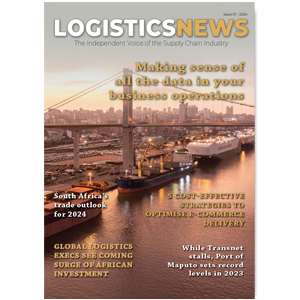As our natural resources dwindle and carbon emissions rise, circular supply chains are becoming more critical than ever. According to author and circular supply chain guru Deborah Dull, we can save the planet using the principles of circularity.
Dull is the author of “Circular Supply Chain”. Her author bio reveals that she fell in love with supply chain almost two decades ago over menu planning and workback schedules. Since then, she has explored different industries through a supply chain lens at Microsoft, the Bill & Melinda Gates Foundation and General Electric. She has inspired thousands of supply chain professionals to learn about circular supply chains through keynote speeches, podcasts and peer-reviewed journals. In June 2024, Dull, who is American, will be in South Africa to share her important circular economy insights and expertise with delegates at the annual SAPICS Conference, Africa’s leading event for the supply chain profession.
“The circular economy is an idea that materials deserve another shot at adding value in our economies. In supply chain, we are the guardian angels of materials and inventory. Look around you. Everything you see was put there by one of us - by a supply chain professional. Every material that is in our economy today is there because we planned, sourced, made, moved and managed it to where it is now. We have the power to change how to we operate, and today, the relationship we have with materials needs to change,” Dull states. “Ultimately, the circular economy is about inventory - extending its life, reusing it, repurposing it or eliminating the need for it altogether. Supply chain is responsible for inventory, and a global, circular economy requires supply chain innovation beyond its current scope in the linear economy,” she expands.
Supply chain’s ability to reduce and eliminate resource requirements makes it integral to any circular business model. “The supply chain contributes to an organisation’s zero waste goals and can help it to reduce its footprint and impact. Supply chains can also circulate inventory. To make the best use of existing inventory and reuse items as many times as possible, a business must know a lot about that inventory. If it cannot virtually ‘see’ its inventory, or if it lacks the ability to easily move it, it often ends up buying or creating more to buffer the system. Supply chains can enable organisations to extend the life of inventory, which is critical in the circular economy. This requires data from different sites to ‘talk to each other’, considering forecasted needs and the cost of transfer. Supply chain can enable this,” Dull says.
Her compelling contributions to the 2024 SAPICS Conference include a practical workshop, a thought-provoking panel discussion and a presentation in which her seminal collaboration with supply chain specialist Douglas Kent will be unveiled. The workshop, hosted by her non-profit, the Circular Supply Chain Network, is called “Taking Your Supply Chain Circular: Accelerating Innovation.” In it, participants will experience circular supply chains hands-on, diving into the concepts, exploring case studies and taking the steps through a transition model to use circularity as an innovation tool for their own supply chains.
In a groundbreaking co-presentation with Douglas Kent, Dull will introduce SAPICS Conference delegates to the UNLEARN model, which serves as a guiding framework for rethinking supply chains to be more sustainable. This model is the subject of a new book co-authored by Dull and Kent. “This book is for supply chain leaders who want to shift their supply chain towards a more sustainable approach. This UNLEARN model is a structure to support these leaders to quickly learn what’s happening in the world of sustainability, challenge common sustainable supply chain myths, identify and prioritise new initiatives, tell better stories and rally change along the entire value chain,” Dull explains.
She will also facilitate a SAPICS Conference panel discussion exploring the younger generation’s role in achieving sustainability goals and a green future. “As Gen Z continues to progress in their careers, and older generations retire, we see a fascinating shift in career norms and the relationship between supply chain and employee.” she asserts. “These days, employees are seeking meaningful and impactful work, especially in terms of sustainable practices and minimal impact to the environment. And because supply chains source, transform and manage the world’s resources and a large portion of the world’s workforce, the decisions made by supply chain professionals have a measurable impact on the world around us. This panel will explore how to engage younger professionals in the supply chain, give space for their message to be heard, and create structured career pathways that create positive impact in the world.”
Now in its 46th year, the SAPICS Conference takes place in Cape Town from 9 to 12 June 2024. It will see hundreds of attendees from around the world gather to network, learn and share knowledge through panel discussions, presentations, workshops and case studies. SAPICS (The Professional Body for Supply Chain Management) is hosting this year’s conference in association with the Southern African Association of Freight Forwarders (SAAFF). For more information or to register to attend the 2024 SAPICS Conference, visit the conference website: https://conference.sapics.org or contact the Conference Secretariat at Upavon Management at info@upavon.co.za



